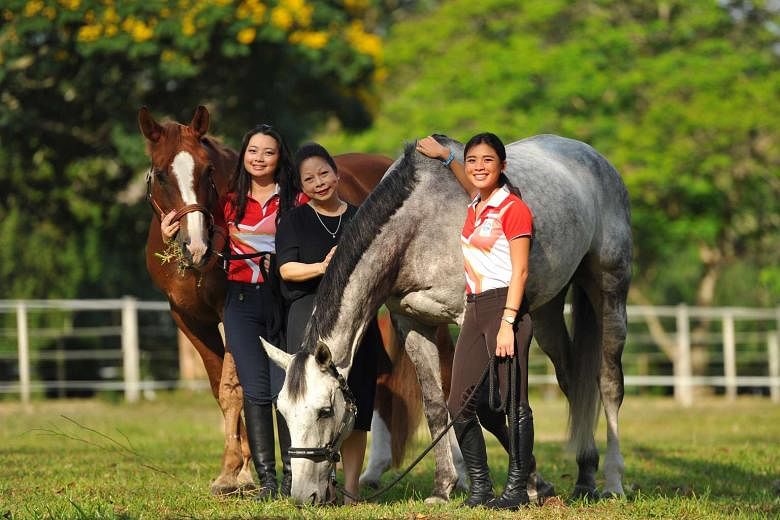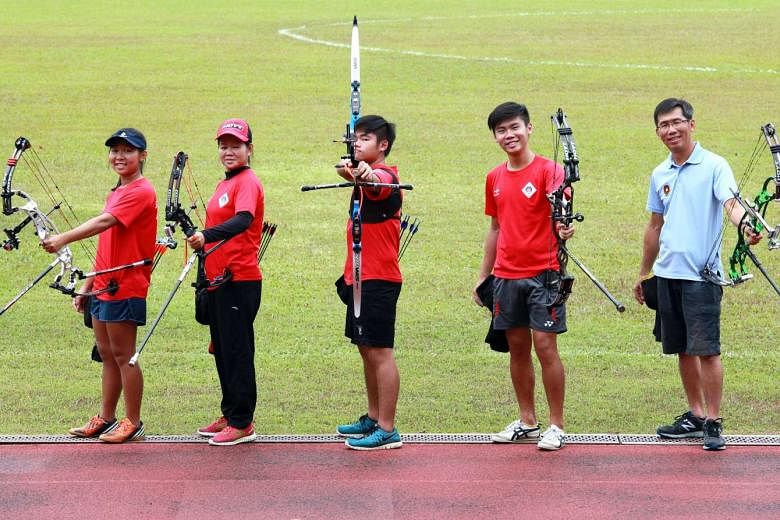In January this year, Nanyang Polytechnic student Sheik Farhan, 17, emerged first in the Class J (90 to 95kg) silat event at the World Championships in Phuket.
His father Sheik Alau'ddin, 47, is a two-time silat world champion and chief executive of the Singapore Silat Federation.
His five siblings, aged from nine to 23, are also silat practitioners. Three of them are in the silat national team's senior squad.
You could say that silat - a form of indigenous martial arts - runs in their blood.
All six children recall training with their father every Sunday from when they were three years old. All of them have competed internationally.
Sporting families such as this silat clan show that talent for a certain sport can be passed on or nurtured from generation to generation.
Several factors come into play that allow for sporting excellence, including training from a young age with expert guidance, parental support, sheer hardwork and discipline, or perhaps even something in their DNA.
Silat champion Farhan says: "With my family involved in the same sport, it's easier to progress as I can get tips and talk to my family members about the sport."
Former Olympic swimmer Bernard Chan, 69, who took part in the 1964 Games, says he encouraged all of his children to take up sports, and swimming was one of the natural choices. One of his three children, Nur Marina Chan, 17, is a national swimmer.
"But I was always very clear that they should not do all this for me, but for themselves," says Mr Chan, who is chief executive of the Association of Accredited Advertising Agents, Singapore.
Marina, who has been swimming since she was four, says her father's achievements do not stress her out.
"In fact, they motivate me to achieve more and dream bigger than he did," says the AngloChinese Junior College student.
Life looks at three other prominent families here who have bonded through sport.
Riding high at the SEA Games
Horses have always been a part of the Chew family. When they were little, the four children spent weekends riding at the Singapore Polo Club and had riding holidays in Scotland and the United States.
Occasionally, they took part in fancy dress competitions for humans and horses organised by the Singapore Polo Club and Bukit Timah Saddle Club.
Mum, Dr Melanie Chew, 60, a military historian, who herself had begun riding for leisure from the age of six, sewed the costumes according to the theme, which could be cowboys or The Lord Of The Rings, while Dad took the pictures.
The family owns four horses. Three are overseas while one is in Singapore.
Their passion for horses has bred two professional equestriennes out of daughters Catherine, 26, and Caroline, 23. Although the two boys stopped riding when they went to boarding school overseas, the girls went on to take part in riding competitions in countries such as Malaysia, India, South Korea and Australia. Both of them have represented Singapore at the SEA Games.
Meanwhile, the sons - Kenneth, 28, a medical resident, and Kevin, 25, a post-graduate student - still ride for leisure.
In equestrian sports, two of the key events are dressage and show jumping. Dressage is a test of style and ability, where horse and rider have to perform a series of predetermined movements. Show jumping sees horse and rider having to clear a series of obstacles within an allotted time.
Catherine, who is a management consultant, has competed in both events at three SEA Games and in jumping at two Asian Games.
She counts as her top performance the jumping event at the Asian Games last year in Incheon, South Korea. While she did not finish in the top three, she was pleased with her 12th position because of the stiffer competition there.
At this year's SEA Games, she took home a silver medal for the individual jumping event as well as a gold medal for the team jumping event.
Sister Caroline, who is a law pupil, won the silver medal in the individual dressage event at this year's SEA Games. She also took home a silver medal for the team dressage event.
Their equine journey has had its fair share of ups and downs.
Catherine broke her collarbone twice. The first was from a botched jump in 2005, while the second was sustained after her horse somersaulted over an obstacle in 2006. Meanwhile, Caroline has suffered from concussions thrice, each time as a result of falling off her horse and landing on her head.
These injuries have not diminished Catherine's love for the sport because she is a "naturally competitive person". She is also passionate about horses. "I respect them, I feel at home with them and I have a bond with them."
The family has also had to live apart as a result of Catherine's training in Germany, which started when she was 15. Dr Chew went with her, leaving her husband and younger daughter in Singapore for four years. Mr Chew is executive chairman of an investment firm.
Dr Chew, who is president of the Equestrian Federation of Singapore, has been working hard to build up a community of Singapore riders to support and help one another. "Catherine never had that support group - she was always alone," she says.
In 2011, led by her efforts, the federation opened the National Equestrian Park off Andrew Road, which is open to the public. It conducts riding classes and provides career counselling for local riders.
Over the years, the sisters have had many different horses, but they name Pikadeur, a handsome, chestnut German steed, as their favourite.
It is "retired from competition and living a good life" in Germany with its first owner, the sisters say.
"He is clever, good-hearted and he will always try to give you what you hope to achieve," says Caroline.
Bowled over by archery
During a 2008 family holiday in Taiwan, the youngest member of the Ang family got his first shot at archery at a cultural village there.
Han Quan, then 10, was instantly hooked. After they returned to Singapore, he pestered his parents to let him have lessons with a bow and arrow.
He started classes at Telok Blangah Archery Club. In the next few years, in quick succession, his older sister, mother, older brother and father all picked up the sport.
Fast forward seven years later and the entire family - apart from father Gary Ang, 51, an operations manager in a logistics firm - is in the national team.
Mother Jocelyn Ang, 45, an internal auditor, was the latest addition this year after emerging tops in a selection trial.
She went on to represent Singapore at the SEA Games this year with her older son Han Teng, 23. Although neither won any medal in this competition, they say they gained valuable exposure and experience.
Competitive archery involves firing arrows from a bow at a target and can be done indoors and outdoors at different distances. Points are awarded depending on where the arrows strike the target.
The Angs own at least 10 different bows and hundreds of arrows, which they keep in bow cases and quivers, in their five-room Housing Board flat in Telok Blangah.
Mrs Ang estimates that she has spent more than $35,000 in the past few years on archery equipment and accessories, including quivers and arrows.
It seems the most fanatical archer among them is Han Teng, the oldest child and a Nanyang Technological University undergraduate.
He is described by his younger brother Han Quan, 17, a student at Ngee Ann Polytechnic, as someone who "eats and sleeps archery".
Not bad for someone who picked up archery only after a shoulder injury in 2012, which prevented him from playing his preferred sports of tennis and rugby.
"I thought archery was very boring as it's a stationary sport," he says.
Seeing his younger siblings in the national team spurred him to get serious about the sport.
"I wanted to be able to travel with my siblings who were going overseas for competitions," he says. Within a year, he made it to the team.
His mother started drawing the bow earlier in 2010. Instead of dropping her children off for target practice, she joined in.
"The first time I went for archery practice, I couldn't even draw the bow," she recalls with a laugh.
Her husband also switched his usual weekend golf games to weekdays and picked up archery in 2013.
Now, the family trains together every weekend. When competitions are around the corner, the sessions can go up to six times a week.
The upshot is, archery has allowed them to exercise together and share a common conversation topic at the dinner table.
Mrs Ang adds that she is proud of her children.
"If not for them, we would not have become so involved in this sport," she says.
Romancing the skis
In their late teens, while they were still dating, Geoffrey and May-Lwin Kee spent weekends romancing each other and water-skiiing in different parts of Singapore - Punggol, Seletar and Coney Island.
This was back in the late 1980s. By 1991, Mrs Kee got so good that she became a national water-skier and won silver in the women's tricks event for Singapore at the 1997 SEA Games in Jakarta with 2,320 points.
The tricks event sees the competitor executing jumps, spins and turns of various degrees using different body parts, with points given according to the level of difficulty.
At a 1991 competition, Mrs Kee successfully did a reverse toe-O - a 360-degree turn while hanging onto the ski rope with one's toes.
The couple wed in 1994 and have two daughters, Kalya, 20, and Sabelle, 17. Both are national water-skiers.
Water sports have always been a part of the sisters' childhood. By the time they were three, they were bobbing behind their water-skiing parents on inflated tyre tubes.
They later started double-skiiing, standing on their father's skis while he was on the water, before learning wakeboarding.
Of the two, Kalya is the more competitive, taking part in junior wakeboarding competitions. When she was 14, she made it to the national team and now straddles being a professional athlete and a student at Yale-NUS College.
Sabelle did water sports recreationally as she was more interested in dance. But after accompanying her sister to last year's Asian Beach Games in Phuket, Sabelle decided to take water-skiing more seriously.
The Anglo-Chinese Junior College student started training and made her SEA Games debut this year, in the process winning a bronze in the women's tricks competition, beating her mother's Jakarta SEA Games record with 2,620 points.
Having tasted success, she wants to continue competing.
Mrs Kee, 49, an associate professor at Nanyang Technological University, hung up her competitive skis in 2000, but her husband, a 51-year-old Singapore Airlines pilot, still competes.
At the 2011 SEA Games, he came in fourth in the men's slalom event. Slalom skiing sees the skier navigating a multi-buoy course on a single ski. Points are scored based on the number of buoys cleared, the speed of the boat and the length of the rope.
He went to the event on crutches because of a torn muscle in the sole of a foot.
He was in pain, but he gritted his teeth, got taped up and competed.
The Kees go water-skiing together at least once a fortnight at Bedok Reservoir.
Kalya says: "My friends don't really hang out with their families much, but we do and we get to be outdoors together."
With some water-skiing competitions coming up with categories for those over 40 to compete in, the Kees are looking forward to the day when the entire family can be in the same competition together.
"If all four of us can compete together, that would be nice," says Mr Kee.





